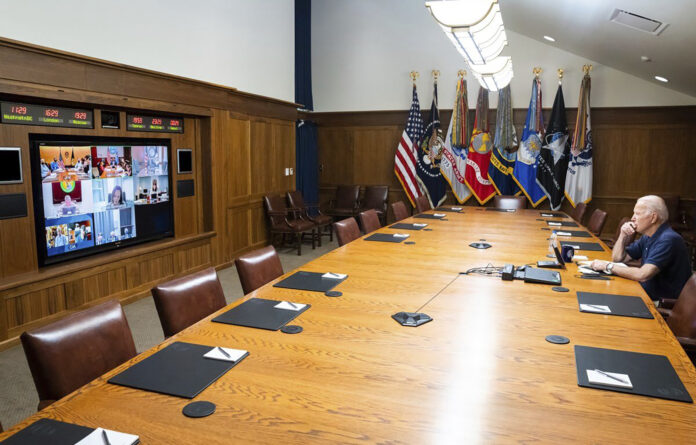I have to start by saying I voted for Donald Trump – twice. Both votes were cast with misgivings. Trump is what he is, and there’s no getting around it: arrogant, self-absorbed, semi-delusional, pathologically resistant to any suggestion that he could make a mistake.
That said, I would still choose Trump over Joe Biden six days a week and twice on Sunday. Biden is president of the United States by default, because the Democrats couldn’t produce a qualified candidate to challenge Trump and because Trump methodically self-destructed in an election he had every chance to win.
But that’s history. None of it diminishes the mind-boggling, sanctimonious hypocrisy of Republicans and their cheerleaders in the media – Fox News, to name the most prominent – who are blaming Biden for the horrifying debacle produced by the U.S. withdrawal from Afghanistan. You want to blame someone? How about George W. Bush, for launching a war in Afghanistan that was doomed from the start? How about Barack Obama, for continuing the war in the face of overwhelming evidence that it was futile? How about Donald Trump, for initiating the disastrous withdrawal that Biden concluded?
And while we’re raining rage on clearly culpable commanders in chief, how about aiming some blame toward Afghanistan’s gutless government and the incompetent, corrupt Afghan military for failing to defend their country despite 20 years of training, support and sacrifice by U.S. forces?
There is more than enough blame to go around for the humiliating finish to a war that started in 2001 as a noble undertaking intended to avenge that year’s 9/11 attacks and prevent future attacks by rooting out Osama bin Laden and the al-Qaida terrorist organization that had been operating under the protective wing of Afghanistan’s ruling Taliban – a regime that was a brutal terrorist organization in its own right.
The Bush administration had a simple and seemingly achievable plan, according to the 43rd president’s memoir Decision Points: “… removing the Taliban, denying sanctuary to al-Qaida, and helping a democratic government emerge.” The U.S. did in fact remove the Taliban as the governing entity and, eventually, managed to track down and kill Osama bin Laden. But the ultimate goal, as Bush defined it in his book, was to “stabilize the country and help the Afghan people build a free society.”
And so it began: a 20-year exercise in nation-building that has now ended with the allegedly built nation succumbing to the aforementioned Taliban just days after the United States pulled up stakes and headed home.
Bush’s fault? Without question nation-building in Afghanistan is a fool’s errand, a lesson painfully learned by the British and the Russians among other invaders before the U.S. decided to give it a try. Bush knew it was a risk but he believed, perhaps naively, that the effort could be successful.
Obama had no such excuse. Even while assuring the public that all was going well the Obama administration knew better, according to an Aug. 16 report by The Washington Post: “In fact, according to documents obtained for the forthcoming Washington Post book The Afghanistan Papers: A Secret History of the War, U.S. military officials privately harbored fundamental doubts for the duration of the war that the Afghan security forces could ever become competent or shed their dependency on U.S. money and firepower…Those fears, rarely expressed in public, were ultimately borne out by the sudden collapse this month of the Afghan security forces, whose wholesale and unconditional surrender to the Taliban will go down as perhaps the worst debacle in the history of proxy warfare.”
So why didn’t we call it off before now? The generous answer would be that our military and political leaders always believed that the mission would be successful, if only we persisted, if only we stuck it out until the Afghans were ready to govern and defend themselves.
The harsher judgment is that no president, no administration wanted to be the one that presided over the tragedy that was sure to unfold once the U.S. pullout was put in motion: the Taliban overrunning the Afghan countryside and seizing cities; helicopters frantically rescuing American personnel from the surging enemy; desperate Afghans swarming the capital city’s airport hoping to escape.
Sooner or later, some president would have to take this hit. An underrated but courageous president named Gerald Ford was the fall guy in 1975 when the U.S. evacuated South Vietnam amid chaotic scenes of would-be refugees trying to climb aboard fleeing helicopters. Biden’s critics have compared the chaos in Afghanistan to the bedlam we saw in South Vietnam 46 years ago.
Does anyone really believe our departure from Afghanistan would have turned out differently if Trump had won re-election? Abandoning Afghanistan was a key Trump campaign promise when he ran in 2016 and the exit plan was in place months before the 2020 election. Of course, Trump being Trump, he might have dumped the plan if someone had convinced him the fallout would be as bad for him as it turned out to be for Biden.
You can criticize Biden for not knowing how bad it would be, or for knowing and not caring. There’s an air of obliviousness to just about everything Biden does, or doesn’t do. But he’s not the reason it turned out this way.
Personally, I’m inclined to believe this outcome was inevitable and give Biden credit for being willing to endure the vitriol as he did what any of three predecessors could have done and should have done – pulled the plug on an ill-advised venture that was always guaranteed to fail. It would have been much easier to accept the futile status quo and leave the pain to some future president.






